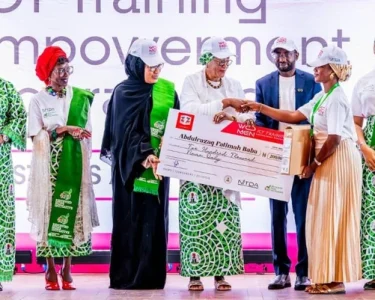The crucial role women and girls play in ensuring the sustainability of rural households and communities, improving rural livelihoods and overall wellbeing, has been increasingly recognised.
Women account for a substantial proportion of the agricultural labour force, including informal work, and perform the bulk of unpaid care and domestic work within families and households in rural areas.
Additionally, the impact of climate change, including on access to clean energy, productive and natural resources, amplify existing gender inequalities in rural areas. Therefore, in 2008, the United Nations passed a resolution to establish the International Day of Rural Women to recognise the impact of women in rural and indigenous communities.
To commemorate this important day and contribute towards creating better opportunities for women to thrive in the climate changing world, Glow Initiative for Economic Empowerment received support from Access Bank to launch the Solar Women’s Program and train 50 women on opportunities in the renewable energy sector (solar) including the basics of designing and installing a solar PV system to generate electricity and Business Opportunities in the sector as an economic empowerment skill that will lift them out of poverty and equip them to combat climate change.
The programme also includes mentoring and business advisory support for 10 select trained women.
This action, according to a statement, saw to an increase in the knowledge of solar technology and subsequently promoted women’s participation in the energy sector aid #ClimateAction.
“For the first part of the Women’s Solar Empowerment Programme, the team trained 50 rural women from Asesse, Pakuro and Omu communities of Ogun state on two broad subject matter areas; Starting your Solar Business (Solar Business Value Chains), Opportunities in the Renewable Energy Sector Sector for Women.
“The women received instruction on the following value chains such as: Curbing Energy Poverty through solar; Solar Design; Solar Product Distribution; Solar Consulting; Energy Audit for Solar Installation; Energy Efficiency and Management; and Retailing solar products and solutions, etc.
“At the end of the training, the stakeholders of the rural communities nominated 10 women to undergo the full week hands on training on Solar PV Design and Inverter Installation which was the second part of the training from 25th to 29th December where they learnt Introduction to Solar Energy, Energy Management and Energy Auditing, Installation Tools and Safety Basics, Solar Photovoltaic System Components, PV Module Fundamentals, PV Battery System Design, PV Controller System Design, PV Inverter System Design etc.
“The goal was to expose the women to various opportunities for local impact. Opportunities with which they can start a new source of income. This action will go a long way to improve the economic situations of the community,” the statement explained.




